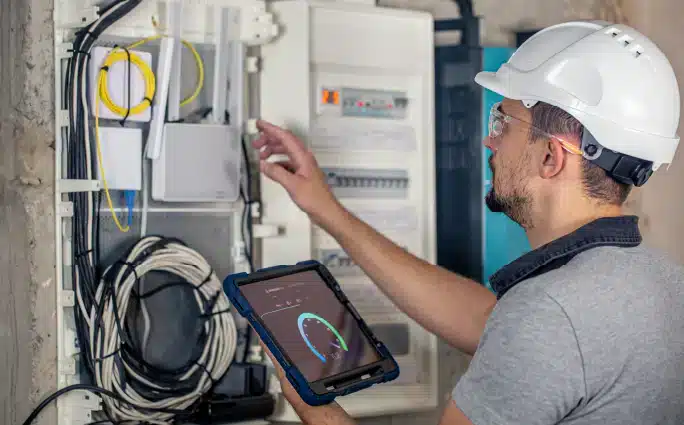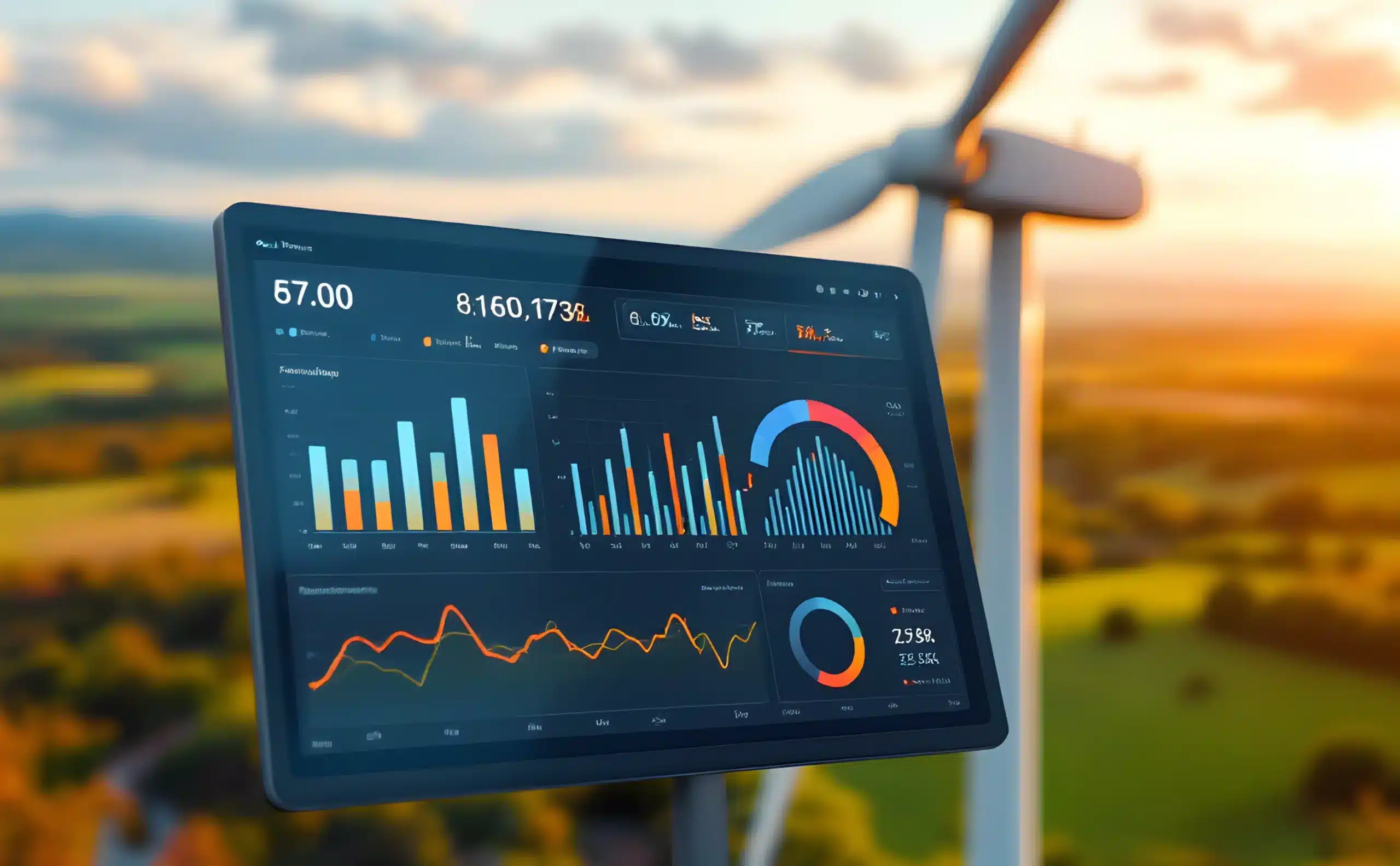Energy Management Solutions
Effective energy management is essential for organizations aiming to meet sustainability goals and regulatory requirements. Businesses can reduce energy expenses by up to 20-30% with optimized energy usage. However, adopting energy management can be challenging due to outdated systems, complex regulations, and lack of expertise. At Utthunga, we simplify this process by delivering customized energy management solutions that monitor, optimize, and reduce energy consumption across operations.
Our solutions include energy audits, real-time monitoring, load management, and renewable energy integration. We use advanced tools and expertise to design and implement efficient energy systems—from system design and procurement to installation, maintenance, training, and continuous optimization. With a proven track record, we help businesses enhance energy efficiency, reduce costs, and position themselves as leaders in sustainability and resource management.
Our Energy Management Offerings

Comprehensive Energy Audits and Assessments
- Thorough analysis of energy use across all utilities
- Identify areas of waste and potential cost reductions
- Actionable insights to optimize resource consumption
Energy Data Modeling and Analysis (Forecasting)
- Predictive analysis for future energy consumption trends
- Data modeling to support cost-effective energy strategies
- Actionable insights for energy optimization and budgeting


Real-Time Energy Data Dashboards
- Live data visualization for easy tracking and decision-making
- Real-time alerts for unusual consumption patterns
- Centralized display of energy metrics for quick assessment
Centralized Energy Monitoring Systems
- Unified platform to monitor all energy metrics
- Seamless integration with existing systems for real-time updates
- Simplified tracking for performance optimization


Pinch Analysis
Utilize advanced vapor recompression and Pinch technology to enhance energy efficiency in industrial applications. We optimize thermal processes for:
- Significant reductions in energy consumption and cost
- Improved sustainability through energy recovery systems
Our Energy Management Development Process

Benefits of Our Energy Management Solutions

Optimized Energy Consumption

Reduced Emissions

Improved Operating Efficiency

Cost Savings
Optimize your energy systems to reduce costs and drive sustainability
FAQs
1. What are energy management solutions?
Energy management solutions are a set of technologies, tools, and strategies that help organizations gain visibility and control over how energy is consumed across their operations. These solutions go beyond just tracking usage—they help companies understand energy patterns, identify inefficiencies, and take corrective action to lower energy costs and carbon emissions. In industrial and commercial settings, this might involve smart meters, automated control systems, and analytics platforms that turn raw consumption data into actionable insights.
2. Why do businesses need energy management solutions?
Energy consumption is one of the largest operational expenses for many businesses, particularly in industries like manufacturing, utilities, and commercial real estate. Without visibility into where and how energy is used, organizations often miss opportunities to optimize their usage. Energy management solutions fill this gap by providing detailed insights into energy consumption, highlighting inefficiencies, and offering actionable strategies to cut costs. In addition to financial savings, these solutions help companies meet environmental regulations, reduce their carbon footprint, and demonstrate leadership in sustainability efforts—factors that are increasingly important when selecting an energy management solutions company.
3. How do energy management solutions help reduce energy costs?
Energy management solutions provide a comprehensive approach to reducing energy costs by identifying inefficiencies across operations. These solutions collect detailed data on everything from HVAC systems to production processes and analyze this information to pinpoint when and where excess energy is being used. For instance, you may find that equipment is running unnecessarily during off-peak hours or that energy-intensive systems are poorly scheduled. By implementing changes based on these insights—such as automating controls or upgrading equipment—businesses can reduce costs effectively. Partnering with the right energy management solutions provider can ensure the changes are tailored to your unique needs, driving a faster return on investment.
4. What industries can benefit from energy management solutions?
Energy management solutions are beneficial across many sectors, particularly for industries with high energy demand or where process control and uptime are crucial. Here are some industries that benefit significantly:
- Manufacturing: Improve energy efficiency across production lines, reduce costs, and enhance operational performance.
- Oil & Gas: Manage energy usage at distributed locations such as drilling rigs and processing facilities.
- Utilities & Power: Improve energy grid performance, reduce transmission losses, and manage peak demand efficiently.
- Pharmaceuticals & Food Processing: Ensure compliance with strict energy consumption and environmental standards for temperature-sensitive production.
- Commercial Real Estate: Manage energy across multiple buildings, optimize HVAC systems, and reduce energy expenses across large commercial properties.
No matter the sector, any business with substantial energy consumption and complexity can benefit from energy management solutions.
5. What is typically included in an energy management solution?
An effective energy management solution typically includes:
- Energy meters and IoT sensors: Collect data from energy-consuming assets across your organization.
- Communication infrastructure: Securely transmit data using protocols like Modbus or OPC UA.
- Software platform: A central dashboard for real-time monitoring, data analysis, and performance alerts.
- Analytics and reporting tools: Enable the identification of energy consumption trends, key performance indicators (KPIs), and optimization opportunities.
- Integration capabilities: Connect seamlessly with existing systems like Building Management Systems (BMS), SCADA, or even renewable energy platforms.
Some energy management solutions companies also offer consulting services to help businesses define their energy efficiency strategies and implement solutions that match their specific goals.
6. How do energy management solutions support sustainability?
Energy management solutions directly contribute to sustainability by reducing energy consumption and minimizing waste. With precise control over energy usage, organizations can lower their carbon footprint and improve operational efficiency. Many platforms also track sustainability metrics—such as energy usage per unit of output or the percentage of renewable energy consumed—enabling businesses to monitor progress against sustainability goals. This helps companies not only meet internal targets but also comply with global standards like ESG or ISO 50001, making it easier to report environmental performance to stakeholders. In fact, working with a trusted energy management solutions provider can accelerate your sustainability initiatives.
7. Do energy management solutions require replacing existing infrastructure?
No, energy management solutions are designed to be flexible and can be integrated into your existing infrastructure. Rather than requiring you to replace your equipment, these solutions typically involve retrofitting with smart meters, sensors, and IoT devices that communicate with your current systems. This allows businesses to gradually upgrade their energy infrastructure without major disruptions or large capital expenditures. By choosing an experienced energy management solutions provider, companies can implement a scalable and cost-effective energy management system that evolves alongside their needs.
8. What should I look for in an energy management solutions provider in the US?
Choosing the right energy management solutions provider in the US involves more than just comparing software features. It’s about finding a partner who understands your industry, your energy goals, and the regulatory environment you operate in. Here are the key factors to consider:
- Industry-Specific Experience: Look for a provider that has worked with businesses similar to yours—whether in manufacturing, utilities, heavy industry, or commercial buildings. Their past experience will shape how well they can address your challenges.
- Comprehensive Technology Offering: A capable provider should offer a complete stack—hardware (like smart meters and sensors), software (monitoring dashboards, analytics, alerts), and integration with existing systems (BMS, SCADA, ERP). Ideally, they should also offer remote monitoring and IoT readiness.
- Scalability & Flexibility: The provider should be able to scale the solution with your operations—from a single facility to multi-site deployments across states. Flexible, modular architectures are particularly useful for companies planning phased rollouts.
- Understanding of US Regulations & Incentives: A good energy management solutions provider in the US will be familiar with federal and state-level regulations (like Title 24 in California, or ENERGY STAR reporting), and help you benefit from programs such as utility rebates, tax incentives, or sustainability credits.
- Security & Compliance: Ensure they follow cybersecurity best practices and compliance standards such as NIST, ISO 27001, or SOC 2—especially if your energy data includes sensitive operational or customer information.
- Support & Long-Term Partnership: Beyond just installation, assess the level of support the provider offers—do they help with onboarding, custom analytics, reporting, and performance tuning? Are they invested in your success beyond deployment?
- Proven Results: Ask for references, case studies, or benchmarks that show how they’ve helped similar organizations reduce costs or improve energy performance.
Choosing a trusted energy management solutions provider in the US means gaining not just tools, but insight, guidance, and measurable value over the long term.
